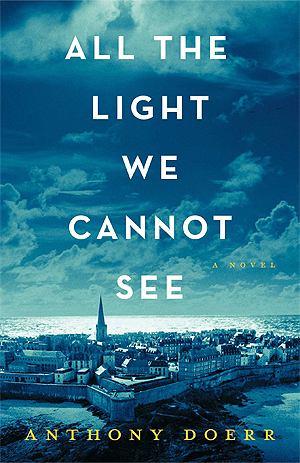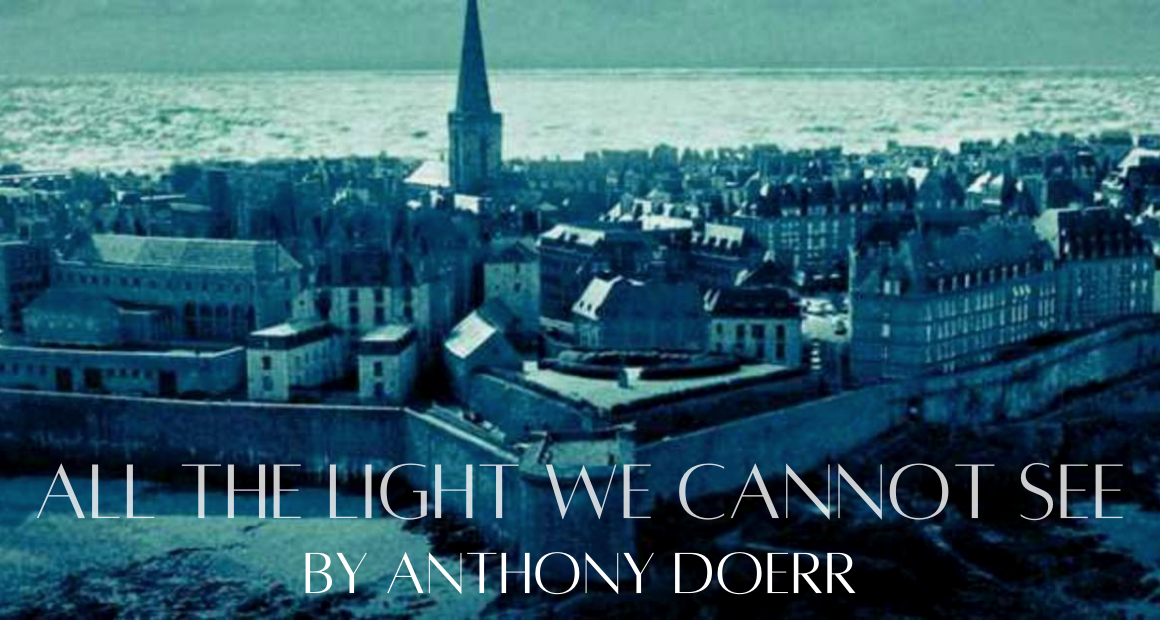Title: All The Light We Cannot See
Author: Anthony Doerr
Publisher: Scribner
Genre: Historical Fiction, World War II
First Publication: 2014
Major Characters: Werner Pfennig, Marie-Laure LeBlanc, Frank Volkheimer, Etienne LeBlanc, Frederick (All the Light We Cannot See), Jutta Pfennig, Madame Manec, Reinhold von Rumpel, Frau Elena, Daniel LeBlanc, Dr. Hauptmann, Walter Bernd, Bastian
Theme: World War II, the Nazis, and the French Resistance; Interconnectedness and Separation; Fate, Duty, and Free Will; Family; Science and “Ways of Seeing”
Setting: Saint-Malo and Paris (France), and Berlin and Essen (Germany), between the 1930s and 2014.
Narrator: Third person, mostly present tense
Book Summary: All The Light We Cannot See by Anthony Doerr
It’s about a blind French girl and a German boy whose paths collide in occupied France as both try to survive the devastation of World War II.
Marie-Laure lives in Paris near the Museum of Natural History, where her father works. When she is twelve, the Nazis occupy Paris and father and daughter flee to the walled citadel of Saint-Malo, where Marie-Laure’s reclusive great uncle lives in a tall house by the sea. With them they carry what might be the museum’s most valuable and dangerous jewel.
In a mining town in Germany, Werner Pfennig, an orphan, grows up with his younger sister, enchanted by a crude radio they find that brings them news and stories from places they have never seen or imagined. Werner becomes an expert at building and fixing these crucial new instruments and is enlisted to use his talent to track down the resistance. Deftly interweaving the lives of Marie-Laure and Werner, Doerr illuminates the ways, against all odds, people try to be good to one another.
Book Review: All The Light We Cannot See by Anthony Doerr
All the Light We Cannot See has won the Pulitzer Prize in Fiction category for Anthony Doerr. There’s actually an entrance fee ($75 entry fee for each desired entry category) to enter all Pulitzer Prize categories. There are total 21 categories for Pulitzer nomination; and in 20 of those categories the winners receive a certificate and a $15,000 cash award. Only the winner in the Public Service category of the Journalism competition is awarded a gold medal.
Now coming back to the book. All the Light We Cannot See is an up close and personal story of two kids, one a German orphan boy with incredible engineering skills, the other a blind French girl who loves to read and sometimes leaves the safety of her uncle’s home where she is cooped up, trying to keep out of the reach of Nazis during world war two. It is historical fiction about courage and hope. In a world tainted by war, death and loss, childhoods are broken. Kids are snatched out of their homes, the place that brought them comfort. Their dreams are shattered. The connections they had are lost. And they have to be strong, but not only for themselves, no, but also for their dear ones.
“Open your eyes and see what you can with them before they close forever.”
The plot is primarily set during World War II and is told through the eyes of three main characters. Marie-Laure, a blind girl who flees occupied Paris with her Museum Worker father, who may or may not have the most coveted diamond in the world – the Sea of Flames; Werner Pfenning, a radio transmitter genius who joins the Hitler Youth to become a resistance hunter; and Von Rumpel, a cancer-ridden Nazi gem hunter who is after the diamond for its supposed magical healing powers. All the Light We Cannot See is a rare gem among WWII novels, and not only because it features a gem. What makes the book so special is that it is so positive even though a lot of harm comes to most characters and not all storylines come to an happy end.
The story begins in 1934, and we are given a peek of pre-war life. When Marie-Laure Leblanc, who was born with congenital cataracts, goes blind at the age of six, her father, a museum locksmith, builds her a thorough miniature of their neighbourhood so she can memorise it by touch. Though it takes a few years of outdoor training with him turning her around three times at different points and asking her to find their way home before it really clicks. Werner grows up in an orphanage with his sister, Jutta. Frau Elena, a Huguenot, tells them stories in French daily. He is tiny for his age, a mechanical genius who repairs and makes a simple radio work for he and his sister to listen to. One day they come across a fabulous French radio broadcast about science and they are mesmerized.
“Time is a slippery thing: lose hold of it once, and its string might sail out of your hands forever.”
Less than a year before Werner is to be sent to work in the local mines, a Nazi officer discovers his mechanical genius when Werner is called to repair a radio that no one else locally has been able to fix. Werner, of course, fixes it, and at the age of fourteen, desperate to escape working in the same mines that killed his father, he is sent to a brutal Hitler Youth academy. Throughout the remainder of his education and career, his sister’s warning words haunt him as he continues to doubt what they are doing, despite the fact that he has always been someone who does what is expected of him.
Marie-Laure and her father leave their apartment just before the Nazis arrive in Paris, forced to walk because no train arrives, carrying something that may or may not be one of the museum’s most valuable items. They end up at the home of her reclusive great uncle Etienne, who hasn’t been right since tragedy struck while he was serving in WW I.
“We rise again in the grass. In the flowers. In songs.”
We are given an insight into a Nazi-occupied town through Marie, and the author does an excellent job of putting you through the misery of the situation. Werner, on the other hand, seeks acceptance in the Nazi regime, and we accompany him through the entire harrowing process.
Honestly, the book was hard on me as it described through the eyes of Werner, the indoctrination and cultish behavior of the German war movement and the extreme brainwashing and strict lives these boys who were chosen lived. And how could it be more difficult to try to live through bombings and raids of the vicious Germans than a sweet blind girl with little ability to protect herself. And yet there is communication through the short wave radios that have been hidden and saved and an interconnectedness that almost seemed only partially scientific and part miracle and spiritual.
“A real diamond is never perfect.”
In the end, 30 years in the future, the story of those who survived is told and touching remnants of some of the dead one’s things get into the right hands, and some of the final riddles are solved, the dead ones now perhaps zooming around in heaven trying to reach out and touch the living, part of the light we cannot see.
This is a unique war story told through the eyes of children. There are no major battles or great conquests; the victims are ordinary, and their town is small and average, emphasising the far-reaching brutality of the war.
The writing is crafted to perfection, I have no doubts of why this book won the Pulitzer prize in the first place. The elements sown into story are so real, so raw. The smallest thing were the things that had the most meaning: the books, the keys, the shells, the ways the author described the smallest moments in our lives: playing in the park, singing, the childhood songs. Anthony Doerr uses a very beautiful language and often quite detailed descriptions which never seem too long or boring. The novel appears to be very well researched. The short chapters make it a very quick-paced read even though the time period narrated is quite long.
“Stones are just stones and rain is just rain and misfortune is just bad luck.”
All the Light We Cannot See is about the unknown heroes, is about the wars , the ones that take place in humans, or the ones that are not fought with guns and still, nonetheless, they require courage, strength and hope.
This book is a glimpse inside the history we don’t know about. The novel describes World War II with honesty and not from an adult point of view, how we are used to, but from a child’s perspective. And not any child, but two directly involved children. War is not only about winning, about freeing one’s country. It is not only about duty, about soldiers dying on the battlefield for their country. It’s also about families losing dear ones, daughters losing parents, siblings losing each other, women being abused, hunger, thirst, coldness, darkness. It’s about wounds that never heal, images that haunt, memories that cannot be forgotten. Because war means scars, and scars are always there.






